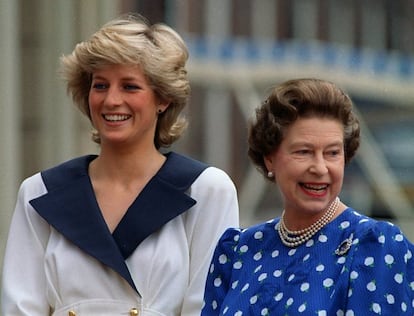A sadness without tears: Britain reacts to Elizabeth II’s death
It is hard to find citizens who do not feel that they have lost a fragment of their own lives, but it is also difficult to find the kind of pain generated by the death of Lady Di

A tragedy, in the classical sense, requires conflict and a fatal mistake that leads to the hero’s destruction. What happened just over 25 years ago, the death of Diana of Wales, was a tragedy. And the United Kingdom seemed to go crazy during the month that followed the fateful event of August 31, 1997. There were even those who called Elizabeth II a “murderer.”
What is happening now is not tragic or cathartic: it is sad, more intimate, much more dignified. It’s hard to find a British citizen who doesn’t feel like they’ve lost a piece of their own life. It’s also hard to find someone who expresses terrible pain.
The death of Elizabeth II is not just a farewell to a woman who was always there, solid, disciplined and exemplary. With her passing, a very long chapter of British history ends as well, one that included the resistance against the Nazi armies and the victory of May 8, 1945, the last great victory of what was once the greatest empire in the world.
And yet, life goes on. It’s business as usual as soon as one steps away from the small Buckingham crowd. No emotional tsunami is on display. Perhaps a long wave is forming that will break in a while. Who knows. The days during which the queen’s body will lie in state to receive the respects of her subjects will, in all probability, be a good occasion to verify the importance (political, social, even psychological) of the deceased queen.
And it will not just be the British. An American couple recently arrived from San Francisco was planning to do so as well. “It’s a great coincidence,” said the man, Frank, “and an opportunity to experience a historic moment, to be able to say for the rest of our lives [both are retired and in their seventies] that we were there and personally said farewell to a great world figure.”
It is very rare to see the British flag at half-mast over Buckingham Palace. It was first seen days after Diana’s death. It was seen briefly after the death of Elizabeth II, until it was replaced with the royal insignia when Charles III arrived from Scotland on Friday. The flag is never seen at half-mast, because the throne is never empty.

When Diana died, her image was plastered in bookstore windows, and anything related to her sold out. At the bookstore Waterstones in Trafalgar Square, just a 10-minute walk from Buckingham, there were two books on display about Elizabeth II on a small shelf away from the door, surrounded by a story about Peppa Pig and an almanac of drawings of London bridges. And in the display window of the famous Foyles of Charing Cross, there were no books about the late queen.
Perhaps the secret was that her reign meant at once everything and nothing. It was the mirror in which the British (and not just them, as she reigned over 15 countries, and in some way, over the 54 members of the Commonwealth) looked to see a more dignified, more firm, more stoic version of themselves – in a way, more British.
Another good place to get a feel of the general mood is the pub. At places like the Coach and Horses or the Bunch of Grapes, there was laughter and loud voices as if nothing had happened.
“I thought she was immortal, really,” said a 30-year-old patron only half-jokingly. “Now we have a new king, an older gentleman who is a little weird.” Then the issue of the new bills came up. Quickly, a consensus was formed: the face of Elizabeth II should continue to illustrate the pound sterling “as always.” Which means 70 years, to be precise.
“God bless her and protect us, because this inflation is going to kill us,” said another, raising a glass.
Tu suscripción se está usando en otro dispositivo
¿Quieres añadir otro usuario a tu suscripción?
Si continúas leyendo en este dispositivo, no se podrá leer en el otro.
FlechaTu suscripción se está usando en otro dispositivo y solo puedes acceder a EL PAÍS desde un dispositivo a la vez.
Si quieres compartir tu cuenta, cambia tu suscripción a la modalidad Premium, así podrás añadir otro usuario. Cada uno accederá con su propia cuenta de email, lo que os permitirá personalizar vuestra experiencia en EL PAÍS.
¿Tienes una suscripción de empresa? Accede aquí para contratar más cuentas.
En el caso de no saber quién está usando tu cuenta, te recomendamos cambiar tu contraseña aquí.
Si decides continuar compartiendo tu cuenta, este mensaje se mostrará en tu dispositivo y en el de la otra persona que está usando tu cuenta de forma indefinida, afectando a tu experiencia de lectura. Puedes consultar aquí los términos y condiciones de la suscripción digital.








































